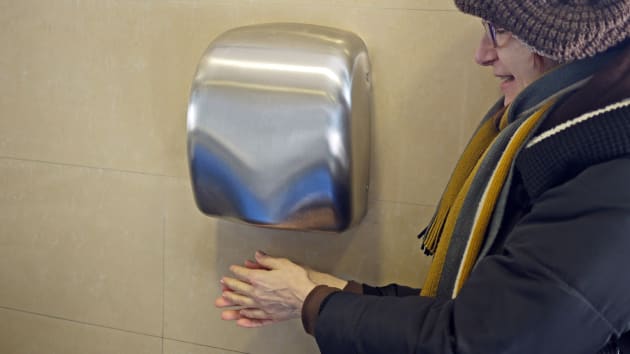👉 Public Info from the Field of Master Mind Health (MMH) 😷
Shared from the desk of: Joseph Mercado 👨
Content Contributor: Delia Mercado 👩
Article Author: Josh Hafner 👱
To: Health Lover 🌱
Blog Post #841 📌
Re: Hand Dryers In Public Restrooms 🚽
Date and Time: Friday, November 22, 2019 at 2:17 p.m. ⏰
Dear Health Lover,
We know fecal bacteria shoots into the air when a lidless toilet flushes — a phenomenon known, grossly, as a “toilet plume.” But in bathrooms where such plumes gush regularly, where does all that fecal bacteria go?
Into a hand dryer and onto your clean hands, perhaps. That’s what a new study suggests. Researchers examined plates exposed to just 30 seconds of a hand dryer compared to those left in, you know, just plain feces-filled air.
The findings: Air-blasted plates carried 18-60 colonies of bacteria on average, whereas two minutes’ exposure to the mere bathroom air left fewer than one colony on average. What’s more, the inside of the dryer nozzles themselves had “minimal bacterial levels.” The results were published recently in the journal Applied and Environmental Microbiology.
For the study, a Connecticut-based team looked at 36 bathrooms at facility of the University of Connecticut School of Medicine, Newsweek notes, where one lab produces large amounts of spores of PS533, a specific but harmless strain of bacteria Bacillus subtilis. Colonies of that strain made up about 2-5% of the bacteria found on the air-blasted plates, regardless of how far the specific bathroom was from the lab where such spores were made.
“These results indicate that many kinds of bacteria, including potential pathogens and spores, can be deposited on hands exposed to bathroom hand dryers, and that spores could be dispersed throughout buildings and deposited on hands by hand dryers,” the authors said.
What’s unclear, they admit, is just why the air-blasted plates showed so many more spores. Dryers could act as “reservoir” for bacteria, they suggested, or perhaps their intense blowing simply provides more exposure to the already contaminated air. And while evidence shows dryers can cover hands in bacteria, they said, it’s not certain whether they deposit bacterial spores.
Regardless, as Newsweek reported, study author Peter Setlow perfers paper towels, which are now stocked at all 36 bathrooms used in the study.
“Bacteria in bathrooms will come from feces, which can be aerosolized a bit when toilets, especially lidless toilets, are flushed,” Setlow told Newsweek.

Email Us a Message
➡ Have a question about this hygene post❓
Please send us an email message below and we will serve you with an answer momentarily. 📩



